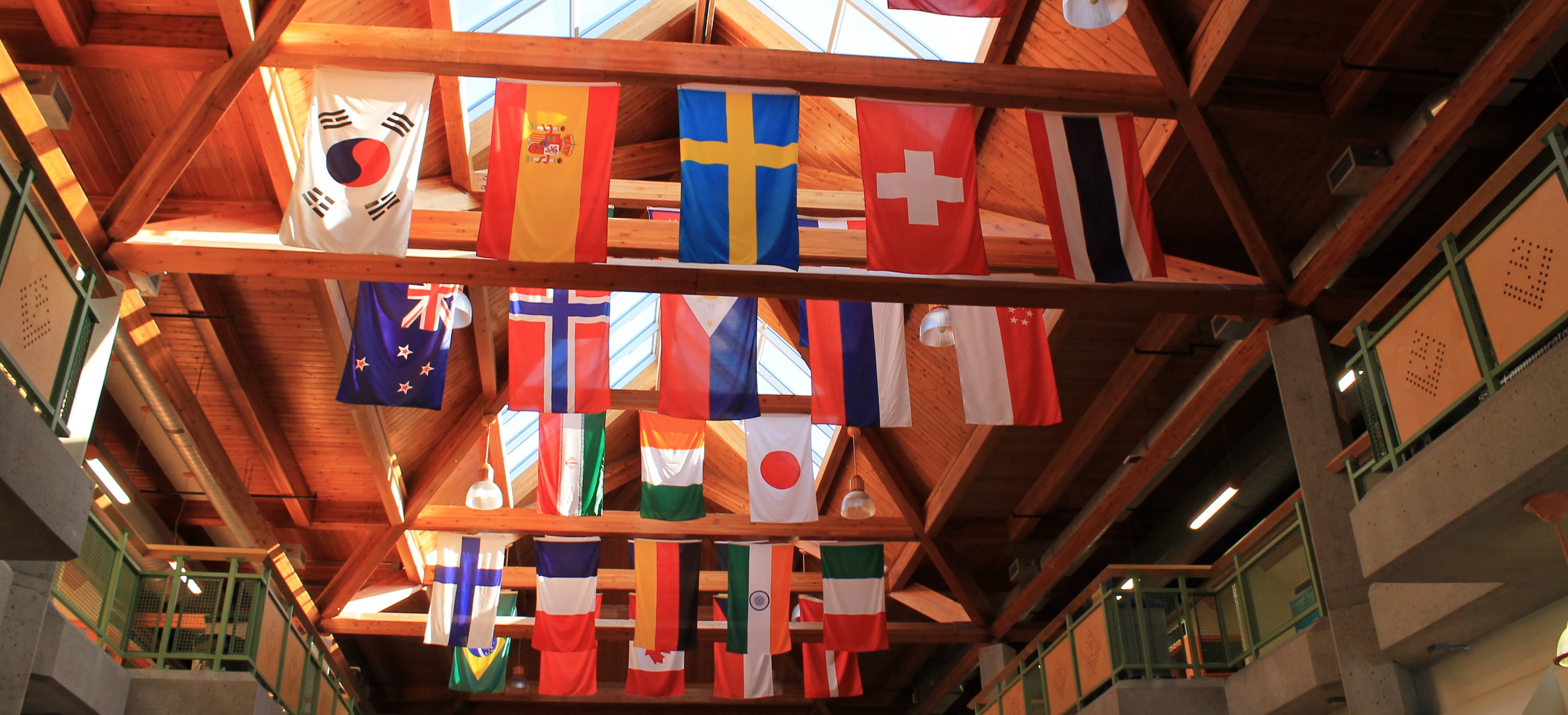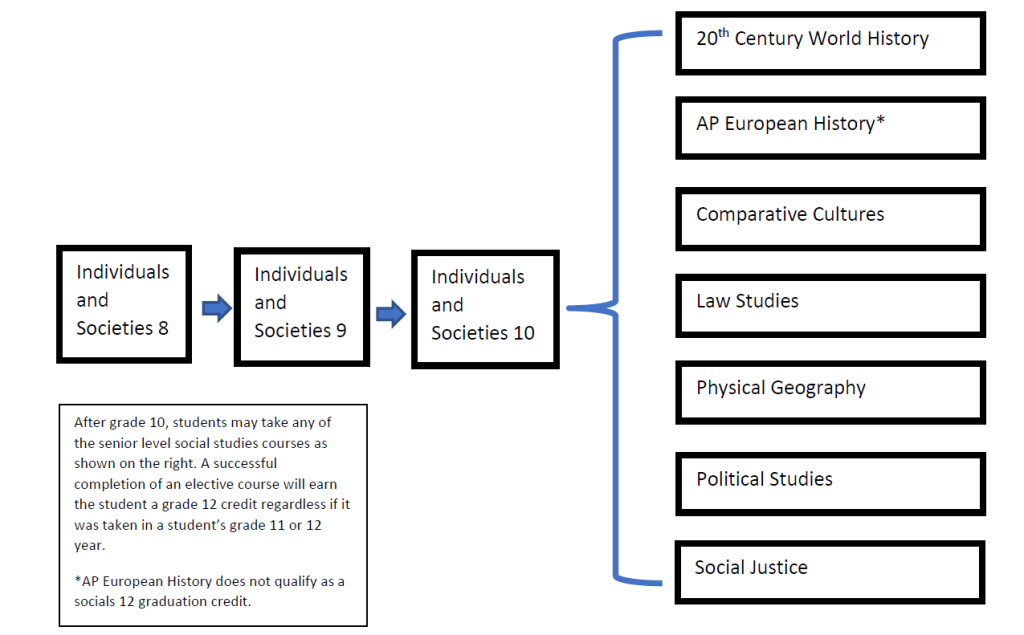
Social Studies
Social Studies
INDIVIDUALS AND SOCIETIES YEAR 3 (SOCIAL STUDIES 8)
(MSS-08-IB)
In Individuals and Societies 8, students will study world history from the decline of the Roman Empire to the Age of Exploration. The course will focus on the historical, political, social and economic development of civilizations throughout the world from 500 to 1600 CE. Throughout the course, students will be encouraged to make connections to contemporary issues and events.
The goals of the course are to develop and improve communication and collaboration skills, critical and creative thinking, and personal and social awareness and responsibility.
INDIVIDUALS AND SOCIETIES YEAR 4 (SOCIAL STUDIES 9)
(MSS-09-IB)
In Individuals and Societies 9, students will study world history from the Age of Exploration to the Industrial Revolution. The course will focus on the emergence of modern nation-states, and the impact of Imperialism from the 17th century to the 20th century. By examining the themes of social, political, and economic revolution, students will better understand the role that individuals can have on societal change. Throughout the course, students will be encouraged to make connections to contemporary issues and events.
The goals of the course are to develop and improve communication and collaboration skills, critical and creative thinking, and personal and social awareness and responsibility.
INDIVIDUALS AND SOCIETIES YEAR 5 (SOCIAL STUDIES 10)
MSS-10-IB (4 CREDITS)
In Individuals and Societies 10, students will study European History from the 19th Century through to the mid 20th. The course will focus on changing value systems, canadian autonomy, canadian government, and global conflicts such as WWI and WWII. Throughout the course, students will be encouraged to make connections to contemporary issues and events.
The goals of the course are to develop and improve communication and collaboration skills, Historical Thinking, and personal and social awareness and responsibility.
COMPARATIVE CULTURES 12
MCMCL-12 (4 CREDITS)
In Comparative Cultures, students will study key ancient civilizations which contributed to the art, language, architecture, religion, philosophy, politics, and laws of western societies. This course focuses on the syncretic nature of culture, art, and mythology. Students will have the opportunity to do both project based and experiential learning. This course is primarily assessed through tests, and unit projects.
Units of study include Ancient Mesopotamia, Egypt, Greece, and Rome.
The goals of the course are to develop and improve Historical Thinking skills, particularly primary source analysis, and historical perspective taking.
20TH CENTURY WORLD HISTORY (HISTORY 12)
MWH–12 (4 CREDITS)
This course is a world history course covering the time period 1900 to present. Topics will include geopolitical, social, economic, technological and ideological developments. Units that are covered:
- WWI and its effects, Russian Revolution, Interwar Period, Turmoil of the 20s, WWII, Cold War, Vietnam, Middle East, China, India, Civil Rights Movement, South African Apartheid
The course will also provide students with opportunities to develop the following skills:
- Library and scholarly database research.
- Analysis of scholarly articles.
- Physical and political geography
- Emphasis on power structures and its effects on geopolitics
LAW STUDIES 12
MLST-12 (4 CREDITS)
Law 12 examines the Canadian legal system and its application to the life of the individual. It is designed to make students aware of their legal rights and responsibilities.
Students will explore the following: The Development of Canadian law, Charter rights and Responsibilities, Human Rights, Criminal Law, Civil Law, Private Law
Over the course of the year, students will engage in a mock trial, attend current court cases in the law courts of Vancouver if possible, learn from guest speakers who work in various areas of Law, and engage in debating current and historical issues.
PHYSICAL GEOGRAPHY 12
MPGEO-12 (4 CREDITS)
In this course students will study 3 areas of concentration: Weather/Climate, Geology and Geomorphology. The course will be taught through the use of Power Points, text books, videos and article reviews. Most units will culminate in a Multiple Choice exam.
POLITICAL STUDIES 11/12
MPLST-12 (4 CREDITS)
In this course, students will study International Relations by exploring the interconnectedness of history, geography, economics, anthropology, and psychology. Students will learn the importance of balancing national interests with the needs of the international community, incorporating differing worldviews into viable solutions, as well as skills such as debate, negotiation, and public speaking.
This course will primarily be taught through problem-based and experiential learning, such as Model UN simulations. Units include the history of the UN, the effect of media on international crises such as the Rohingya genocide, the challenge of decolonization, as well as the impact of economic imperialism on modern slavery.
Students will have the opportunity to participate in the Vancouver Model United Nations Conference held at the Hyatt Regency in January. Other out of timetable events, and school fees may be a component of this course.
SOCIAL JUSTICE 12
MSJ–12 (4 CREDITS)
Social Justice 12 is a senior course designed to raise students’ awareness of social injustice, enable them to analyze issues and situations from a social justice perspective and to provide the skills, knowledge and framework for advocating for a socially just world. The course provides an opportunity in which students can critically look at the values and diversity of our community and nation.
Topics of study include, but are not limited to: Assessing Personal Beliefs and Perspectives, Rights and Freedoms, Race and Racism, Poverty, Indigenous Peoples and Reconciliation, LGBTQIA2S+, Gender, Climate Justice, Misinformation.
Students can engage in written assignments, presentations, debates, oral responses, and have the chance to attend out of school workshops when possible, and participate in Social Justice activism.
AP EUROPEAN HISTORY
AHI–12 (4 CREDITS)
The AP course in European History is an exceedingly rich and interesting course designed for students who desire to complete an introductory-level university course at the secondary school level. Students in AP European History are expected to demonstrate a knowledge of chronology and of major events and trends from the High Renaissance (1450) to just after the end of the Cold War (2001). The course will examine history through the following themes: cultural, diplomatic, economic, intellectual, political, and social. Fundamentally, this course offers students the opportunity to make sense of an increasingly complex world by understanding how historical European society has influenced and shaped our world today.
AP European History requires that students be disciplined and highly motivated. Students will be required to stay current with their readings prior to class and to ensure that assignments are completed on time. This course is partially blended (75% in class; 25% online), therefore students will meet once a week Tuesday or Wednesday (depending if it falls on a Day 1 or Day 2) from 1:45 to 4:00. The remainder of time will be spent following the modules laid out on the website provided by the instructor. This will also give students the opportunity to receive one-on-one tutorial time with the instructor later in the week. The purpose of this scheduling is to allow students from around the district an opportunity to take another Humanities-based AP course and to experience a university setting.
Note: It is recommended that students have a minimum average of 5 (MYP grading) in Social Studies 10. It is also recommended that to improve success of AP Euro that students take 20th Century History first in grade 11.
AP PSYCHOLOGY 12 (a social-science elective)
(APSY-12 ~ 4 CREDITS)
Advanced Placement Psychology is an elective course open to both grade 11 and 12 students. It is a general introductory psychology course equivalent to first-year university studies. AP Psychology will introduce you to the study of the behaviour and mental processes of human beings and other animals. You will be exposed to the psychological facts, principles, and phenomena associated with each of the major subfields within psychology. During your exploration of these fields, you will also learn about the ethics and methods psychologists use in their science and practice. How does memory work? Is behaviour determined by nature or nurture? How are fears created? What is the interplay between thought and behaviour? These and many other fascinating questions will frame the subject matter of this course.
It is recommended that students enrolling in this course have a strong academic standing and/or are highly motivated to undertake this rigorous academic curriculum. Strong reading comprehension and time management skills are required.
NOTE: AP Psychology includes social studies content but it is considered an elective course. It will not fulfill the Social Studies 11/12 course requirement for graduation.
In a semester timetable this course may require tutorial attendance in the morning, after school, or during X-Block. Please plan accordingly.
For post secondary requirements, please check with your counsellor.
